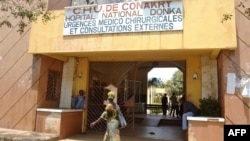Health officials in Guinea are on high alert, after four cases of Ebola turned up in Conakry, the capital city that is home to at least two million people.
Guinea's health ministry says the four new cases involve people who are believed to have had contact with the body of an earlier victim.
Authorities say before the cases were confirmed in the capital, most of the people who tested positive for the deadly Ebola virus had been in the more rural southeastern region.
The World Health Organization (WHO) says at least 66 people have died and more than 100 have been infected in Guinea since start of the hemorrhagic fever outbreak.
In a statement Thursday, WHO said neighboring Sierra Leone and Liberia have also reported suspected cases and deaths.
The Ebola virus is highly contagious. It causes symptoms that include high fever, vomiting, diarrhea and bleeding from the eyes, ears, nose and mouth.
Health officials are urging caretakers and funeral workers to minimize direct or close contact with those who may have been infected.
Guinea's health ministry says the four new cases involve people who are believed to have had contact with the body of an earlier victim.
Authorities say before the cases were confirmed in the capital, most of the people who tested positive for the deadly Ebola virus had been in the more rural southeastern region.
The World Health Organization (WHO) says at least 66 people have died and more than 100 have been infected in Guinea since start of the hemorrhagic fever outbreak.
In a statement Thursday, WHO said neighboring Sierra Leone and Liberia have also reported suspected cases and deaths.
The Ebola virus is highly contagious. It causes symptoms that include high fever, vomiting, diarrhea and bleeding from the eyes, ears, nose and mouth.
Health officials are urging caretakers and funeral workers to minimize direct or close contact with those who may have been infected.





